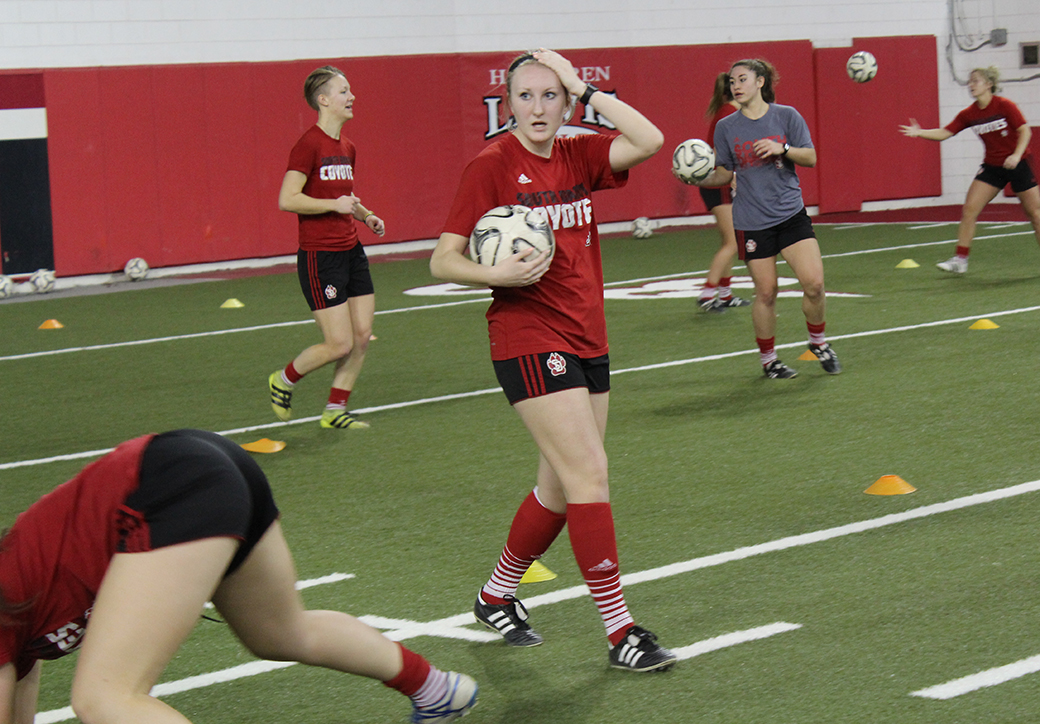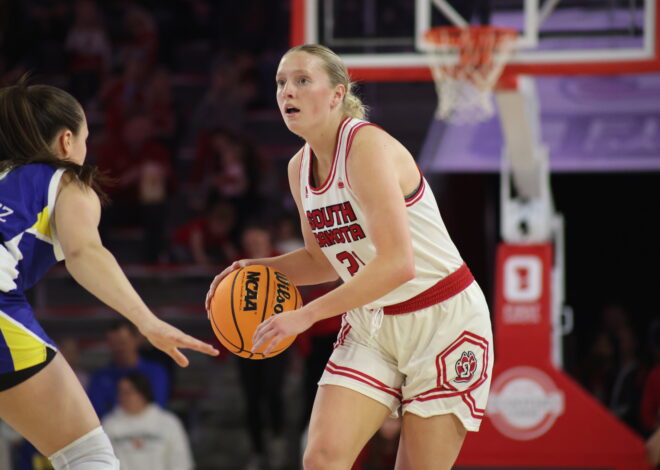
Schedules present challenges for athletes
At 6 a.m., while many students on campus are still asleep, most USD student-athletes are already awake and practicing.
Practices are held early to accommodate the student-athletes’ busy schedules. Even in the offseason, athletes can face 20 hours of practicing a week.
“Right now we are in our offseason. It’s our spring season so we just started doing our 20-hour weeks,” said sophomore soccer player Makenzie Burmeister. “We practice from 6 a.m. to 8 a.m. every morning and then we have weekends off.”
Student-athletes face intensely busy schedules, having to balance full class loads with practices and weight training. Burmeister said missing classes for games is common, and making up the work can be challenging.
She added that scheduling her time carefully is essential to getting her work done.
“Scheduling my time is a lot of it actually,” Burmeister said. “Planning out and making sure I use my time wisely is a lot of what I have to do.”
Burmeister, an art education major, said she practices in the mornings and goes to weight training in the evenings.
“A typical Monday is I wake up at 5:15 and go to practice until 8,” she said. “I go to class from 9 to 11:50, and then I have a class from 12 to 12:50 and then a class from 1 to 1:50, and my last class is from 2 to 4:50. And then I typically just walk straight over to the Dome and get ready for lifting at 5:30 to 6:30. And then go back and do some homework so I can get to bed at a decent time so I can wake up again the next day early.”
Burmeister said her coaches work hard to accommodate players’ schedules.
“We all come into it knowing that we are student-athletes, and the student comes first,” she said.“They do a really good job of working with us in that aspect.”
Mandy Green, head coach of the women’s soccer team, said the soccer team also takes on some responsibility for making sure the players are on top of their academic work.
“What we do is, if we find they are falling behind in class, they can’t come to soccer,” Green said. “They’ll use that time that they would have during training to be in the library to study, or to get with a tutor.”
A.G. Kruger, assistant track and field coach, said athletic programs are constantly trying to work around students’ academic activities.
“We really do pride ourselves on taking academics seriously,” Kruger said. “We’re going to do whatever it takes as a coaching staff, and that’s what we get paid for. We’re going to do whatever we can to make sure they have the best experience, not just athletically, but also academically, because we understand they are going to be doing something else other than track and field for the rest of their lives.”
Student-athletes must meet requirements set out by the NCAA, many of which are academic. If students fail to meet the requirements, they become ineligible to participate in their sport.
All student-athletes at USD are advised by three people who run the Student Athlete Success Center. The center is responsible for making sure student-athletes meet NCAA eligibility requirements.
“In addition to advising, we provide academic support,” said Colleen Evans, director of the Student Athlete Success Center. “Generally, it’s the same support for non-student-athletes, I just think probably the athletes take advantage of the tutorial support. They can go to the SI sessions, they can go to the business tutoring center, just as non-athletes do.”
According to the Student Athlete Success Center, grades among athletes at USD are mostly above average. Last semester, the women’s basketball team had an average GPA of 3.7. Most athletic teams’ average GPA’s are above 3.0, with the lowest of last semester being the men’s basketball team at 2.69. Players on teams with historically low GPA’s must meet with someone at the Student Athlete Success Center.
Green praised the Student Athlete Success Center for helping student-athletes.
“Our Student Athlete Success Center does a good job of helping our athletes schedule classes where it’s a little easier to manage with the practice load they have,” Green said. “They’re great with helping with tutors. There’s a lot of good resources on that side of campus and they do a good job of staying on top of things.”

